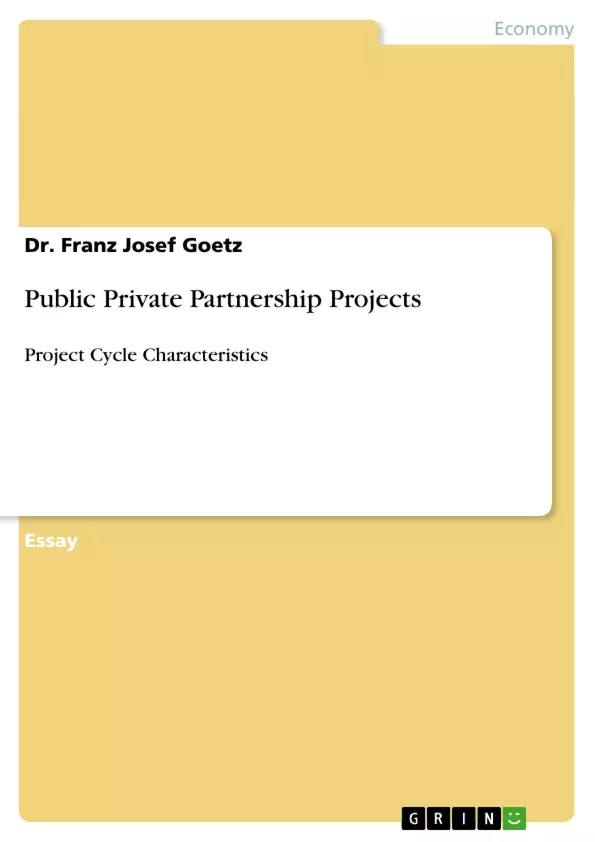Investing in transport has been traditionally in most of Europe, and even more so in the socialist world, the sole responsibility of governments. Today, transport investment is no longer only a public affair, but PPP-Public Private Partnership projects are strongly concentrated on road investment.
Steadily growing infrastructure extension and modernisation needs on the one side, and limited public budgets on the other have driven us to explore new ways of finance. PPPs, in short: the pooling of private and public funds became an accepted formula for ensuring key infrastructure investments. Nevertheless the problem remains, namely "how to bring the formula to work"?
Public-Private Partnerships: The right way towards sustainable transport development?
Investing in roads, bridges, ports or in public utilities has been traditionally in most of Europe – and even more so in the socialist world - the sole responsibility of governments. In Germany, the concept of privately financed and managed infrastructure has been even unthinkable still during the 1970s. Today, transport investment is no longer solely a public domain and Public-Private Partnership (PPP) initiatives are strongly concentrated on the transport sector.
Steadily growing infrastructure extension and modernisation needs on the one side, and tight national budgets on the other, have driven us to explore new ways of project finance. PPP’s , in short: the pooling of finance and the grouping of multiple responsibility in a single contract, became an accepted formula for ensuring key infrastructure investments and public services. Nevertheless the major challenge still remains in most countries, namely “how to bring the PPP concept to work ?”
The motives of national governments for drawing on private inputs for infrastructure and public utility development are manifold and reasonable:
- Firstly, the governments try to tap the creativeness and efficiency of the private sector with a view to eradicate inefficiency and improve transport sector performance;
- in fact, as evidenced by European Investment Bank (EIB) experience[i], cost overruns and delays in project implementation are much lower in PPP projects than compared to traditional infrastructure projects financed from sovereign lending.
- Secondly, as already pointed out, governments worldwide attempt to strengthen by means of private sector involvement their infrastructure investment ability.
- Thirdly, there is also an important side effect to PPP projects: Necessarily, joint private – public undertakings are to be based on detailed technical, economic and financial project evaluations and a competitive dialogue during the tender and award process. As such, they contribute to increased cost transparency and help to separate sustainable projects from bad projects.
- Finally, PPPs create jobs and economic growth.
From a general transport policy point of view, the ” out-sourcing “ of non-core public structures and services to the private sector by means of PPPs, can be considered an instrument of sustainable transport policy, as long as the private project partner is reliable and the projects are sustainable in themselves. International finance institutions, such as for example the World Bank or the EIB can play a pilot role in the support and mediation of PPP projects.
From an individual project point of view, apart from finance reasons, private involvement in project development can be required on technical and operational grounds. The possibly most eye-catching example for such type of PPP has been so far the highly complex and ambitious European Galileo satellite navigation program, a system which shall complement the American GPS system[ii].
Galileo is actively promoted by the Community Institutions and the European Space Agency for joint undertaking for two major reasons:
Although Galileo will be a genuine public service, it at the same time offers excellent opportunities for private concessionaires, as it requires for a successful project development and deployment the research know how and marketing skills from the private sector.
[...]
[i] Reportedly by some 50%. European Investment Bank (EIB) ,International Conference on perspectives for Ukraine on implementation of PPP infrastructure projects, co-organized by EBRD/MoTC Ukraine, Kiev, 21.03.2006
Frequently asked questions
What is the central theme of "Public-Private Partnerships: The right way towards sustainable transport development?"?
The text examines the increasing role of Public-Private Partnerships (PPPs) in transport infrastructure development as an alternative to traditional government funding.
Why are governments increasingly turning to PPPs for transport projects?
Governments are motivated by several factors, including the need to tap into private sector efficiency and creativity, strengthen infrastructure investment ability given tight budgets, enhance project evaluation and transparency, and stimulate job creation and economic growth.
How do PPPs contribute to improved project performance?
According to European Investment Bank (EIB) experience, PPP projects tend to have lower cost overruns and delays compared to traditionally funded infrastructure projects.
In what way can PPPs be seen as instruments of sustainable transport policy?
By "outsourcing" non-core public structures and services to reliable private partners, PPPs can support sustainable transport policy, especially with the support and mediation of international finance institutions like the World Bank or EIB.
Beyond financial reasons, what other factors might necessitate private involvement in projects?
Private involvement may be required for technical and operational expertise, as exemplified by the European Galileo satellite navigation program, which necessitates research know-how and marketing skills from the private sector.
What is the Galileo project, and why is it relevant to PPPs?
Galileo is a European satellite navigation system intended to complement the American GPS system. It serves as an example of a complex PPP where private concessionaires play a crucial role due to their research and marketing capabilities.
What are the key benefits of PPPs highlighted in the text?
The key benefits include leveraging private sector efficiency, improving project implementation speed and cost-effectiveness, increasing investment capacity, enhancing project transparency, and stimulating economic growth and job creation.
- Citation du texte
- Strategic Transport and Economic Planning Services Dr. Franz Josef Goetz (Auteur), 2009, Public Private Partnership Projects , Munich, GRIN Verlag, https://www.grin.com/document/136115



